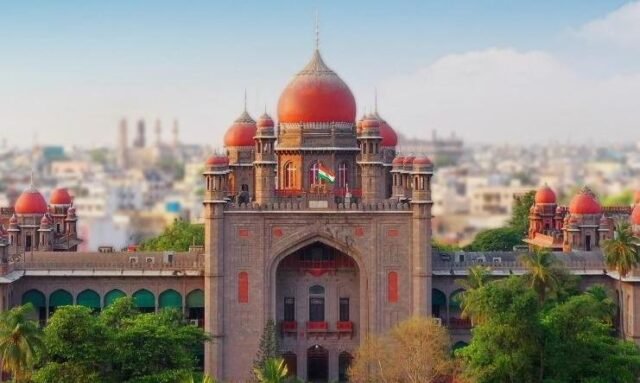Hyderabad: The Telangana High Court has improved its rate of disposal of cases over the years, but it was offset by a similar spurt in new cases, keeping the overall pendency of cases high.
According to the National Judicial Data Grid, over 2.45 lakh cases are pending at the Telangana High Court. Among them, the highest are writ petitions (1.4 lakh), followed by appeals (40,506), cases/petitions (30,727), and revisions (17,476).
Though data shows that the High Court had seen fewer disposal of cases like 2019 and 2020, the disposal rate picked up in 2022, 2023, and 2024. Disposals were higher at 73,615 compared to new 71,139 cases filed in 2022. Similarly, 69,723 were disposed of in 2023 as against 63,651 new cases filed. In 2024, 72,182 cases were disposed of, while 70,623 cases were filed, showing a positive progress toward reducing pendency.
In 2025 so far, the High Court has disposed of 23,384 cases, which is slightly more than the 23,184 cases filed.
According to experts, vacant judge posts, insufficient infrastructure, frequent adjournments, and absence of witnesses often slow down proceedings.
A senior public prosecutor at Nampally criminal court said, “Disposals have increased but fresh cases are being filed daily and many are complex, requiring multiple hearings. Courts are not in required numbers, similarly, there is shortage of judges and public prosecutors. Without adding more courts and judges, we are only managing the load.”
He said out of sanctioned 11 judge posts at Nampally sessions court, 5-6 judge positions are always vacant, adding burden for other judges who have to handle multiple courts, resulting in delays.
Advocates believe that increasing the number of judges and courts is the major long-term solution.
“We need to double or triple the judges to speed up the delivery of justice. Since every case is a new challenge, nuances are different, facts are different, there’s a great need for more efficient district judges to address the pendency,” said a senior advocate L. Ravichander, who is also a member of the High Court Legal Services Committee.
Civil cases are said to take longer than criminal ones. Advocate Jaya Sheela recalled a case on illegal construction in Attapur, which was filed in 2009 and is still pending. Another lawyer, requesting anonymity, said, “We can’t really say that one person is at fault here. Every stakeholder involved in some or the other way is responsible for these delays.” She also pointed out that some advocates might intentionally prolong cases as longer cases means more income.
Advocate Chikkudu Prabhakar explained, “Writ rules say counters must be filed within six months, but many lawyers don’t file it within six months. Courts are not taking a strict action, though they have the power to forfeit counters.”
Litigants too continue to wait for justice. A litigant, who asked for anonymity, filed a cheque bounce case five years ago in 2021 said, “Whenever the judge is on leave, my case gets pushed again and again.” Another litigant, Durgamma has been fighting a criminal case for over a year without an advocate due to financial constraints.
However, the judiciary has taken steps to reduce pendency. ‘Fast-track courts’ have been introduced for POCSO and women-related cases, but their functioning is also hit by fewer judges than needed.
Lok Adalats held quarterly, help settle compoundable criminal cases like cheque bounce, traffic challans, and electricity theft. Hybrid hearings in the High Court have also helped proceedings continue smoothly.
“The idea of evening courts, which will operate from 5 pm to 9 pm, are being explored to address the backlog of cases,” said advocate Jayasheela.
Institutions like Lokayukta and State Human Rights Commision also provide alternate platforms for citizens. Kishan Kumar who filed a case against GHMC authorities in Lokayukta in 2023, is hoping to get justice soon. “Those, who can’t afford to appoint an advocate, can file their cases in Lokayukta as there’s a direct interaction between public and Judges,” he said.
Advocate Adarsh Kandika believes that supervising the work of advocates can also reduce pendency. He developed a legal innovation app called Centralised Legal Network Solutions. “Here clients and advocates can access case tracking journeys and there’s a supervision in the app to make sure that there are no delays,” he said.
Despite ongoing efforts, courts remain under pressure. The numbers may suggest progress, but on the ground, the journey to timely justice still has a long way to go.







